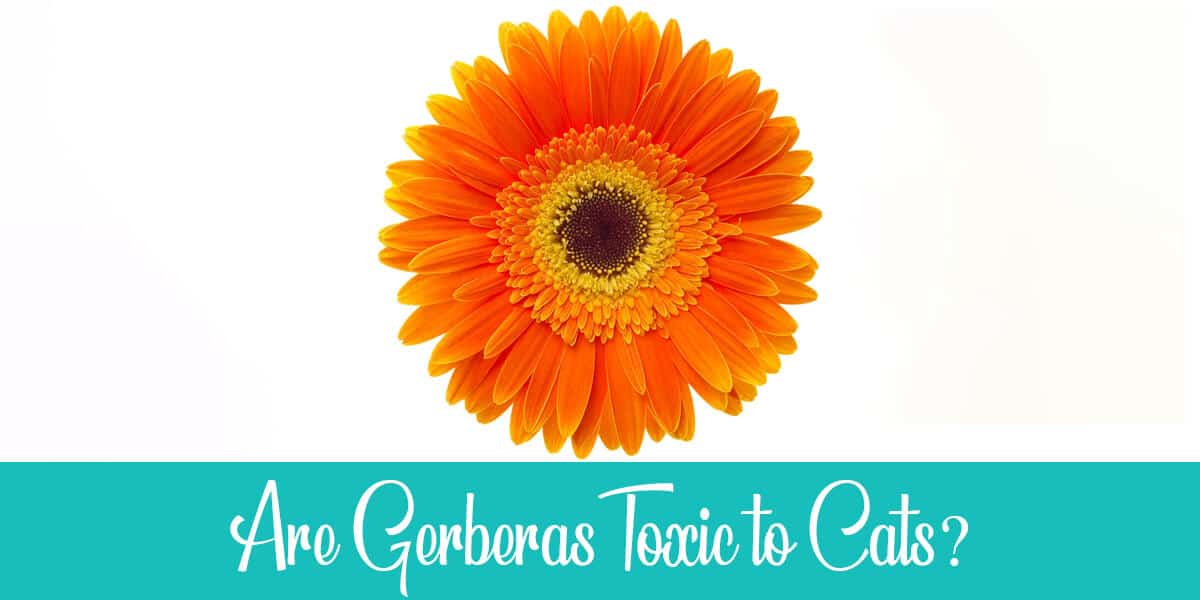Did you know that The Netherlands produces over 900 million Gerberas every year?
This produces a wide range of colors, making the Gerberas included in any flower arrangements for different occasions. Their bright colors must’ve caught your eye somewhere.
Maybe you planted them as colorful summer bedding in your backyard, received them as a lovely flower bouquet, or had them as a decorative indoor plant. Gerberas are also used as decorative cake toppers because of their vivid colors.
Considering how widespread Gerberas are, your cat most probably will run into a bunch of them. And even though cats are carnivorous, they occasionally get tempted to nibble on some plants.
Table of Contents
Are Gerberas Poisonous to Cats?
Gerberas aren’t toxic to cats. However, Gerberas can upset your feline’s stomach if eaten in large quantities. This isn’t a reaction to eating Gerberas only. Instead, it’s because cats aren’t herbivores; their tummies can’t digest plants.
If you use chemical fertilizers or pesticides on your Gerberas, you’re exposing your cat to a toxic hazard. Chemical fertilizers and pesticides residue stays on the Gerbera leaves and can make your cat seriously ill.
What Are Gerberas?
Gerberas are part of the Aster family, also known as the daisy family. They’re native to tropical regions such as South America, Africa, and Asia.
Gerberas have long thin stems, dark green leaves, and very soft petals. Their sizes vary from the mini Gerbera at 1.6 inches to 4 inches across. This makes them bigger than regular daisies.
Gerbera’s can be easily planted and grown indoors or outdoors. ASPCA has a limited list of plants that proved to be safe to grow with a pet.
So as a cat owner, planting a Gerbera would be an easy and excellent choice.
Are Gerberas Edible?
In general, Gerberas are non-edible plants, but they’re also not toxic.
For humans, Gerberas are plants that our bodies can benefit from them. They’re full of vitamin C, so some cultures brew Gerberas to get all their benefits as a natural supplement.
As for wild animals, deer and rabbits consume Gerberas in great quantities unharmed. Gerberas are non-toxic to horses and dogs as well.
Cats too can eat Gerberas, but not regularly or excessively. This is because their bodies don’t get any nutrients from the Gerbera, and their tummies don’t do well with digesting plants.
You can turn a blind eye to your cat taking a quick bite of your Gerbera, but it shouldn’t be a regular meal. Because in the long term, feeding your cat a Gerbera will do more harm than good.
Related:
– Are Freesias Safe for Cats?
– Fuchsias Safety for Cats
– Are Lisianthus Poisonous to Cats?
– Are gardenias safe for cats?
Symptoms of Eating a Gerbera
Since your feline friend’s a carnivore, it shouldn’t be having any plants as a part of its diet. But due to cats’ curious nature, they might chew on a bouquet or two.
You can expect some minor to major symptoms if your cat nibbles at your Gerbera.
If your cat eats just a quick munch of Gerbera, expect little to no symptoms at all.
A Little more than a munch, you can expect an upset stomach and maybe your little friend will skip a meal or two. But that will pass in a day.
Eating too much Gerbera, your cat may experience severe indigestion. This includes vomiting or/and diarrhea. In this case, you should immediately get back to your vet.
These various symptoms can occur to your cat as a result of eating a Gerbera, other plants, or a problem ingesting any other substances. If symptoms persist, a visit to the vet is necessary.
Can a Gerbera Be Harmful to Your Cat?
The Gerbera is a cat-friendly plant. But if you’re using chemical fertilizers or pesticides, You will harm your cat.
Notice if your cat seems unwell in any way. Look for symptoms that show that your cat suffers from an irritated stomach.
The severity of the symptoms may vary according to the concentration, type, and quantity of the product you used on your Gerberas.
1. Fertilizers
Depending on the quantity the cat ate, symptoms may vary from a mild upset stomach to severe vomiting and diarrhea.
2. Insecticides and Pesticides
Your little feline will show symptoms of poisoning. Vomiting, diarrhea, loss of appetite and weight, and seizures
It’s always better and safer to contact your vet immediately if your cat eats the chemically fertilized or treated with pesticides Gerbera.
Recommended: are bromeliads toxic to cats?
How to Protect Your Cat From Poisoning?
There are some precautions that you can take to make sure your cat is safe, and your Gerberas are well nourished and protected.
- Stop using chemical or toxic fertilizers and pesticides for your Gerbera.
- Use natural fertilizers and organic pesticides to nourish and protect your Gerbera.
- Keep your cat away from the Gerbera while treating it with any products.
How to Protect Your Gerbera?
By nature, cats like to dig. Your Gerbera’s soil may feel or look like its litter. But this is harmful to your Gerbera. The digging can expose the Gerbera’s roots, which will cause it to wilt and die.
Cats are also curious. And they satisfy their curiosity by smell and taste. That may be one of the reasons your cat might nibble your Gerbera.
On the other hand, your Gerbera won’t die if your cat eats the flower. Although it won’t look as beautiful, you won’t lose your Gerbera. You may lose it if your cat decides to bite into the stem.
How to Cat-Proof Your Gerbera?
There are many ways to paw-proof your Gerbera.
- Move your Gerbera away from your cat’s way for the safety of both.
- Put soft stones on top of your Gerbera’s soil to protect it from the digging claws.
- Place a natural cat repellent like citrus or mint next to your Gerbera.
- Invest in a scratching post that might gain your cat’s interest more than the Gerbera.
Conclusion
Are Gerberas poisonous to cats? Gerberas are not toxic for your sweet feline.
Cats are not herbivores though, so Gerberas can’t be on their regular diet. If your cat took a few bites of your Gerbera, keep a close eye on it to make sure it didn’t cause any digestive complications.
Train your cat to stay away from your Gerbera, and you can keep enjoying its delightful colors in your home.

I’ve been living with cats since 2008 and I can confidently say I have more feline friends than humans lol. I currently live with 5 cats in different life stages; two of them are less than one year old, one is 2-ish years old and the oldest two are 9-ish years old. I’ve developed a strong bond with cats over the years and I’m eager to share my experience through this blog. You can learn more about my cats here.

